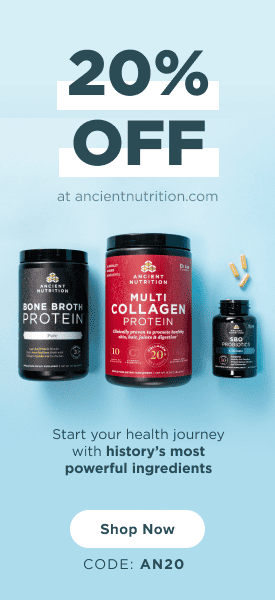This Dr. Axe content is medically reviewed or fact checked to ensure factually accurate information.
With strict editorial sourcing guidelines, we only link to academic research institutions, reputable media sites and, when research is available, medically peer-reviewed studies. Note that the numbers in parentheses (1, 2, etc.) are clickable links to these studies.
The information in our articles is NOT intended to replace a one-on-one relationship with a qualified health care professional and is not intended as medical advice.
This article is based on scientific evidence, written by experts and fact checked by our trained editorial staff. Note that the numbers in parentheses (1, 2, etc.) are clickable links to medically peer-reviewed studies.
Our team includes licensed nutritionists and dietitians, certified health education specialists, as well as certified strength and conditioning specialists, personal trainers and corrective exercise specialists. Our team aims to be not only thorough with its research, but also objective and unbiased.
The information in our articles is NOT intended to replace a one-on-one relationship with a qualified health care professional and is not intended as medical advice.
How to Use a Food Journal to Benefit Healthy Eating Decisions
September 14, 2021

A food journal, also called a food diary, is a tool you use to keep track of everything you eat and drink each day. It can take many forms — such as a simple list on paper, a document you keep on your computer or a log you keep with help from some of the best health apps available on your phone.
If you want to switch to a cleaner way of eating, the first thing to work on is understanding your current eating patterns. For example, maybe you’re someone who eats on-the-go often while distracted or when you’re feeling bored or sad.
Until you’re aware of these types of habits it can hard to break them and replace them with better alternatives.
Are food journals effective? Research suggests that, yes, overall journaling about your diet offers a number of benefits. People who track their diets and use food journals tend to better understand what and how much they eat — plus they benefit long term from a lower risk of weight gain/obesity and related conditions, such as diabetes.
How to Use a Food Journal
What should you write in a food journal?
Ideally, you should track every single thing you eat and drink. The more details and information you have, the better.
For the best results, focus on accuracy and consistency.
In your food journal you want to keep track of:
- What exactly you ate. Add details, and be specific, such as by including dressings, toppings, etc. It’s best to write things down as soon as you finish eating them so you don’t forget details.
- How much you ate (your portion size). List the amount of the food and drinks you consumed, even if it’s just an estimate. It can be helpful at first to weigh and measure your food, and then you can try eyeballing portion sizes, such as 1/2 cup of veggies or one cup of pasta. A three-ounce cooked portion of meat is about the size of a deck of cards.
- The time of day/which meal it is (breakfast, snack, lunch, dinner, dessert, etc.).
- Other factors like your mood, energy and location. For example, you might note that you were at a party, a restaurant or eating in a rush while at work.
Benefits
1. Increases Self-Awareness
Once you’ve tracked your food intake for at least one week, and ideally longer, you’re able to step back and make observations about what you eat on a regular basis. Data about your diet can reveal trends and patterns that you might not have been aware of previously, such as how your emotions and lack of preparation contribute to your food choices.
When it comes to eating healthy long term, the greatest benefit of a food tracking is that it addresses problematic habits that you might otherwise overlook or ignore. It’s much like speaking with a dietician, since it keeps you accountable for your actions.
2. Can Help You Eat More Mindfully
When you know you’re going to have to record everything you eat, you’re less likely to indulge in unhealthy foods or to eat very large portions.
Once you’ve identified areas for improvement in your diet, you can use this info to start making healthier choices and to practice mindful eating. Mindful eating involves eating slowly and without distraction, listening to physical hunger cues, eating only until you’re full, and making nutritious choices that you know benefit your physical and mental health.
Before eating and then recording your meals in your journal, slow down and ask yourself some of these questions (you can also record the answers in your diary if that’s helpful):
- How hungry am I?
- Am I eating enough vegetables and fruits today?
- Is this serving size the right amount based on my needs right now?
- Is this what I’m actually in the mood for?
- Am I eating lots of sugar or refined grains today?
- Am I drinking sugary beverages or too much alcohol or caffeine?
- Is my mood impacting my choices today?
- Am I rushing and distracted or paying attention and savoring while eating my meal?
3. Can Support Weight Loss/Weight Maintenance
According to Harvard Health Publishing, “Research shows that for people interested in losing weight, keeping a journal can be a very effective tool to help change behaviors.”
One large study found that participants who kept daily food journals lost twice as much weight as those who kept no records of what they ate each day.
A number of other studies have revealed that participants involved in lifestyle management programs often cite that “self-monitoring their dietary intake” plus consistent physical activity are the keys to their success long term.
Which is the best method of food tracking for weight loss? One study had participants track food intake with either a pen and paper, a memo pad on their phones, or with a calorie tracking application on their phones.
Results showed that those who tracked with the phone app were more consistent about tracking, but overall weight loss was about the same between the different groups.
However, another study found that 70% of participants rated an electronic food diary as easier to use and more fun when compared to a traditional, paper-based estimated food diary.
Another potential way to use a food journal for weight loss is track your macronutrient intake — if you’re doing the “If It Fits Your Macros” — or to track your sugar, carb and fat intake if you’re doing the the keto diet or another low-carb diet.
4. Useful for Identifying Allergies/Intolerances
Some doctors use their patients’ food diaries to understand their eating habits, how their diets may be contributing to certain health problems and to make dietary recommendations accordingly.
Once you’ve kept a food journal for several weeks, consider sharing it your doctor for help if you’re struggling with issues like IBS, food allergies or stubborn weight gain. He or she can review your diary and refer you to an allergist or dietician if necessary.
A food diary is also helpful when following an elimination diet in order to see if it helps improve digestive issues related to intolerances. In this case, you’d use your food diary to keep track of what you ate/didn’t eat and how you felt after, and then you’d compare the data to how you felt once you reintroduced or eliminated a certain problematic food.
Food Diary Template/Examples
How do you make a food diet journal? First, decide which type of journal you want to keep: one written with pen and paper, a digital doc on your computer, through an app, etc.
If you choose to use a good, old-fashioned notebook, make sure it’s one that you can take out and about with you, for example a small journal that can fit in your work bag or purse. This will help you stay consistent.
If you prefer to use your phone and an app, you’ll have a bunch of options. What is the best food journal app? Two popular apps are Lose It! and MyFitnessPal, which also offer information on calories and other nutrition info to make tracking meals easy.
For even more support, consider tracking your food intake with a friend or family member so you keep each other accountable and on track.
Here’s an example of what you might enter into your food diary after one meal (you’ll want to repeat this throughout the day every time you eat):
- Breakfast: ate 1 cup corn flakes with 2 cup whole milk, 1 small apple, 1 cup black coffee.
- Cornflakes had 6 grams sugar per serving. Eyeballed the serving size based on previous measurements.
- Ate alone before work, while sitting down in kitchen. Felt calm but a little rushed.
- Tried to remain undistracted and to take my time chewing. Felt satisfied after but hungry about 2 hours later. Digestion felt good, but could use more energy today.
What to Avoid (Plus Risks)
Overall, there’s a lot to gain from keeping a food log and little risk involved. However, one potential drawback is that some people may become obsessive about tracking their food intake, which can become stressful and potentially fuel disordered eating behaviors.
While food tracking can help you make better choices and maintain a healthy weight, it’s not intended for anyone with a history of an eating disorder or who tends to become obsessed with self-improvement. Try your best to be accurate and truthful in your journal (or else what’s the point of keeping it?), but don’t beat yourself up if you slip up here and there — since this is expected!
Conclusion
- A food journal, also called a food diary, is a tool you use to keep track of everything you eat and drink each day.
- You can use data from your diary to make healthy changes to your diet, to cut out processed foods or allergens, and to support weight loss.
- When keeping a log of your food intake, try to stay accurate and consistent for best results. Enter data about what you ate, how much, where, with whom, and how you were feeling before and after.
- You can choose to keep a handwritten diary or use a phone app for help. Either way, try to be specific and enter details that help you form patterns, but don’t become obsessive about being “perfect,” which can cause unwanted stress.













